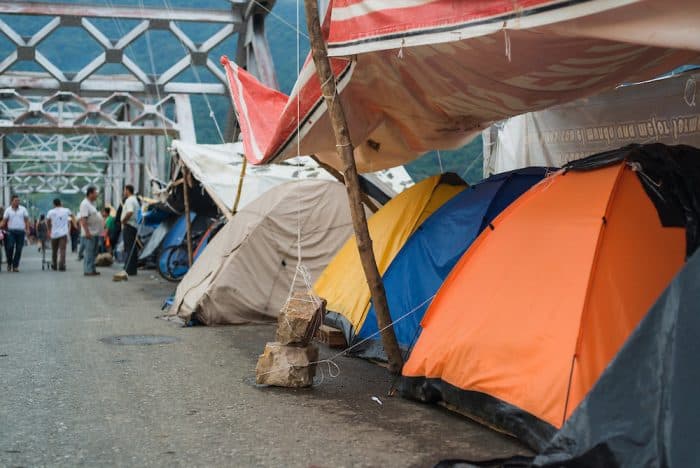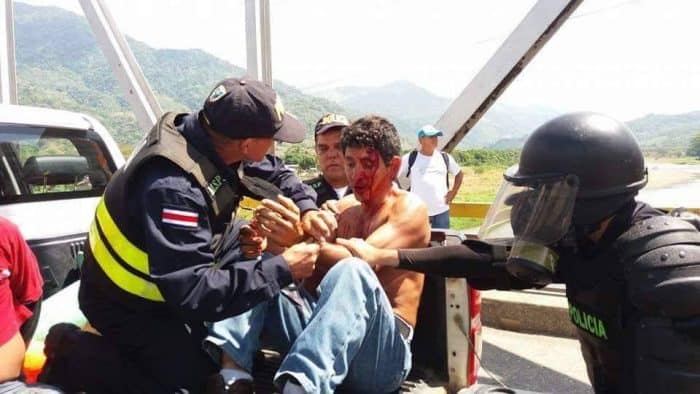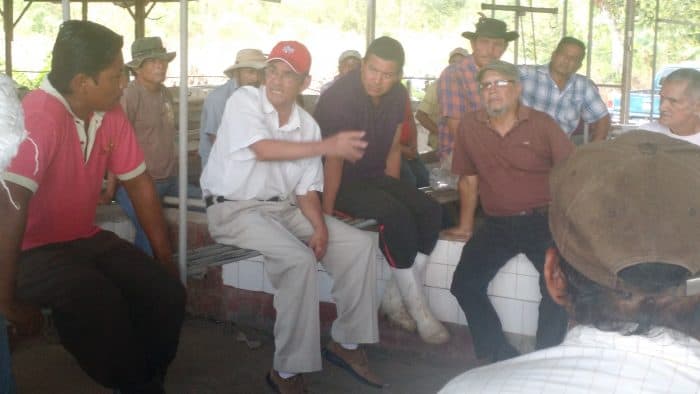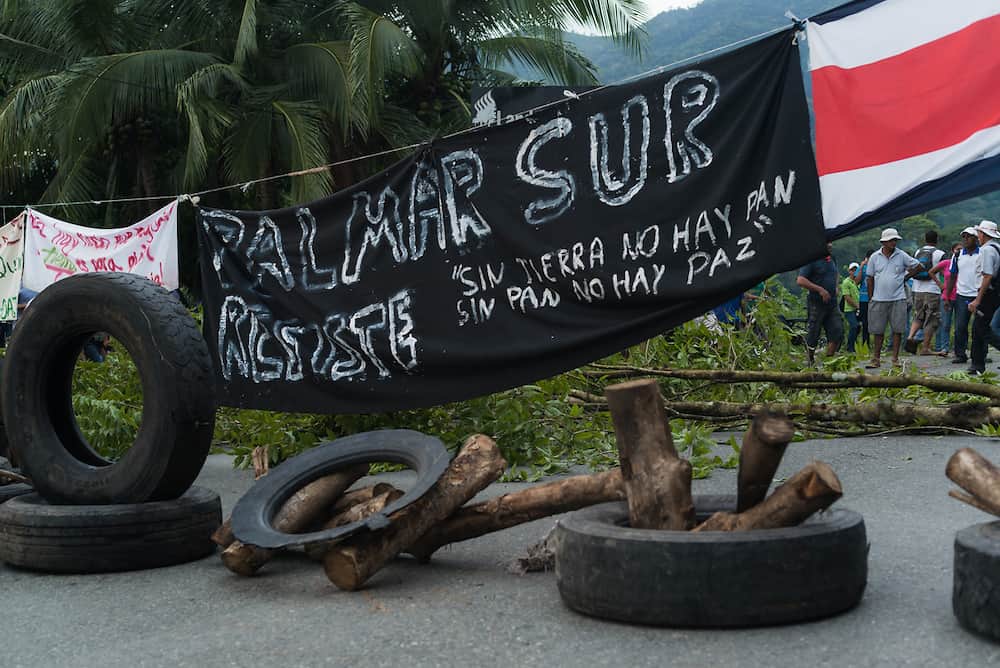PALMAR SUR, Puntarenas — Past the kicked-up dust that spirals over these rock-laced roads and beyond the banana leaves that wave under the wind, the faint echoes of voices and cheers spill from an old packing house.
The sign over the open gate that leads to the gutted-out tin shelter reads in Spanish: “Chánguena and Térraba banana plantation. Private Property.”
More than 50 squatters from Chánguena and other neighboring plantations in Palmar Sur met at the packing house on Friday, the day they were supposed to be evicted from the parcels where landowner Oscar Echeverría says they’re trespassing — some of them for 14 years.
The campesino squatters have managed to stave off evictions for more than a decade, but recently the government’s attempts to kick people off the plantation have gotten more serious.
After an initial, largely unsuccessful eviction in July of last year, a second eviction was scheduled to take place last Friday. But it was suspended a few days prior by the Constitutional Chamber of Costa Rica’s Supreme Court, known as Sala IV, so that judges could evaluate several requests for an injunction.
Then, on Tuesday, Sala IV ruled against one of the injunctions, removing one of several hurdles blocking another eviction.
It’s just the latest chapter in a long and complicated land dispute which has various branches of the government at odds and fumbling in the search for a solution. Besides the government’s problem-solving reputation, at stake are the lives of dozens of families, the land rights of a prominent businessman and a piece of earth whose value could swell if tourism takes off in the region.
Banana Republic
Though escalating tensions have brought the Palmar Sur land conflict into the media recently, the dispute actually dates back to the 1980s. Large banana plantations, including some owned by the United Fruit Company, sprung up in Costa Rica’s southern Pacific region starting in the late 1930s.
These plantations traditionally provided housing for workers onsite. When workers staged a major strike in 1984, many banana companies abandoned the region, leaving workers without jobs or a place to live.
In the fallout, several cooperatives formed to continue farming the area, including COOPALCA, which owns the Chánguena farm. COOPALCA farmed bananas and cocoa in the area but was largely unprofitable. In 1991, the cooperative leased the Chánguena property to businessman Oscar Echeverría Heigold for 20 years.
Echeverría — who owns Motores Brítanicos, the exclusive distributor of Land Rovers in Costa Rica — started two banana companies on the land. Workers and their families lived in homes on the property in an area known as “Cuadrante 3.”
The venture was a bust, however, and in 2001 the companies went the way of other banana plantations in the area and closed.
According to campesino organizer Daniel Villalobos, workers were fired and received no pay for their last month and a half (three quincenas, or pay periods) on the job. In protest, the workers continued to occupy the homes in Cuadrante 3 and eventually started their own cooperative, COOTRAOSA.
Villalobos, who is a member of COOTRAOSA, said many families who had worked the banana fields had nowhere to go when the work dried up, so they stayed on the land, farming and raising livestock.
The former workers eventually recovered their back wages from Echeverría in 2009, Villalobos said. And they stayed on the land, even though Echeverría had filed court papers to expel them years earlier, in 2001, the same year his banana operations closed.

Phantom co-ops; Disputed land
For more than a decade, with the eviction tied up in the courts, the squatters lived and farmed the land while Echeverría grazed cattle on it — a relatively peaceful coexistence. José Mora, an instructor with Kioscos Ambientales, a social action arm of the University of Costa Rica, said the campesinos were waiting until Echeverría’s concession ended in 2011 to organize a legal attempt to formalize their claim on the land.
But COOPALCA, the legal landowner, has not taken any action to remove Echeverría, leaving the property in a legal limbo where the only people not making a claim on the land are the actual owners of it.
“COOPALCA is like a phantom co-op,” Mora said, “They don’t really do anything.”
Echeverría’s eviction case against the campesinos was tied up in the courts until 2014, when a San José court ruled in favor of Echeverría and ordered the government to remove the squatters.
In recent years, campesinos have erected shacks on the farm, separate from the more formal homes in Cuadrante 3. Mora said it’s unclear whether the new squatters are associated with the residents of Cuadrante 3.
The Tico Times spoke with several squatters participating in last week’s protest who said they had come to Chánguena at varying times within the last decade.
In the meantime, Mora said campesinos living in the disputed area started to meet regularly to discuss an approach to legalize their right to the land.
The eviction
On June 24, 2015, an administrative court sided with Echeverría and ordered the families removed by Aug. 5.
According to Presidency Vice Minister Ana Gabriel Zúñiga, the Solís administration asked the Government Attorney’s Office to suspend the eviction and clarify whether Echeverría had a right to request it. But the administration’s request was denied and it ordered the Public Security Ministry to remove the squatters in July.
At the time, there were 119 families living on the disputed land, according to a statement from Casa Presidencial.
“It’s difficult,” Villalobos, the campesino leader, told The Tico Times last year. “We work in the fields but no one has [deeds to the land]. Without those papers we’re open to eviction at any time.”
Villalobos said that the families in Chánguena understood their position was precarious, but in the past they had always been able to appeal any order to evict them, therefore delaying an actual order.
This time, however, the eviction date came as a surprise to community organizers, and Villalobos said there was no time to appeal. Instead, police arrived and told squatters they had two hours to leave the Chánguena and Cuadrante 3 properties.
When campesinos could not reach an agreement with the police, they blocked the bridge on the Inter-American Highway that spans the Río Grande de Térraba bridge, on July 30.
Mora, from the University of Costa Rica, said he was troubled by the fact that families living in the long-standing homes in Cuadrante 3 — not just those who had set up shacks on the farm — had been targeted by the eviction. Homes were damaged and windows broken during the eviction.
There have been conflicting reports about who was responsible for this damage. Campesinos blame the National Police who were tasked with the expulsion order, while officials have denied officers were responsible for property damage.
Failed talks
After taking the bridge and setting up camps last July, campesino leaders demanded the government find a lasting solution that would allow the families to stay on the Chánguena property. Villalobos said they want the government to legalize their ownership of the land.
Several rounds of negotiations between the Presidency Ministry and the campesinos have started and stalled since the July 30 eviction. The Solís administration offered to resettle 60 of the families on a 6-hectare property owned by the National Housing Mortgage Bank in Palmar, with potable water, wastewater and electricity. Most have refused to leave Chánguena.
Campesino protesters and university students took the bridge again on Aug. 14 to pressure the government to give the Chánguena residents title to the land, a move that derailed talks with Presidency Minister Sergio Alfaro.
Families began rebuilding and repairing their homes on the property.
An airport and an uncertain future
Running parallel to these land disputes and, some say, influencing them, is a proposal to build a $40 million international airport. The site of the proposed project lies near the the Chánguena property, 5 kilometers from the town of Palmar Sur.
The newspaper El Financiero reported in 2013 that the Environment Ministry had received environmental impact studies for the project. Mora, the university instructor, said the project is still making its way through the initial studies, but if it were to move forward, it would transform the rural canton of Osa and drive up land values across the region.
Campesino leader Daniel Villalobos said he was wary of the potential airport project.
Presidency Vice Minister Zúñiga told The Tico Times last year that the government was open to dialogue with the families “within the bounds of what is possible.” At the time, Zúñiga said that expropriation was not on the table and that the government was obligated to execute the court’s ruling.
The administration’s handling of the Chánguena eviction last year was criticized by the Ombudsman’s Office. Ombudswoman Monserrat Solano told Channel 7 TV News on Aug. 19 that the displaced families’ human rights were violated in the court-ordered expulsion.
President Luis Guillermo Solís met with campesino leaders in the wake of an Aug. 20 demonstration in front of his home in the San José neighborhood of Escalante. Both sides again agreed to negotiate, but talks quickly broke down.
A second eviction, ordered in September, was supposed to be completed within three months, but still has not been executed.

Looking for trouble?
After new demonstrations on the Térraba bridge earlier this month, including a bloody protest on Tuesday, Feb. 16, in which seven workers got arrested, the squatters say they’re more unified than ever.
Other unions and university groups have come to Palmar Sur to lend their support to the squatters’ cause.
“This requires a revolution,” Guillermo Keith of the National Employees Union told the squatters at a meeting last week. “This is your land. You have to defend it.”
President Luis Guillermo Solís told the daily La Nación last week that outsiders had been visiting Palmar Sur in recent days to stir up trouble.
“They go there looking for a fight and to see how the police will react,” Solís told reporters Wednesday.
Solis has continually told the Palmar Sur squatters that his administration will not negotiate deals under perceived threats, like blockades on the bridge.
The campesinos maintain that their demonstration last week was peaceful until police showed up, and that they weren’t blocking traffic on the bridge. According to multiple protesters on the bridge that day, police told the 50-some demonstrators that they had five minutes to leave or else they would be arrested.
Eddy Morales, a community leader and one of the seven arrested, said that when police detained fellow squatter Daniel Villalobos, the other protesters rushed to defend him. Those who got close enough were met with unwarranted violence, he said.
Morales said he was kicked in the ribs and dragged by the neck by officers. He was then thrown into jail for a day and given a month’s probation from protesting on the bridge, he said.
“If defending the land is a crime, then you’re going to have to punish a lot more than just me,” Morales said. “Here, the land issue isn’t just ours, it’s one that thousands of people have.”
Squatters like Morales and Carlos Vargas say that Echeverría has no claim to the land because his lease expired years ago. La Nación has reported that the Government Attorney’s Office made a court-sanctioned deal with Echeverría to evict the squatters in exchange for Echeverría’s promise not to sue the government for failing to evict them during the more than a decade since he first made the request.
Echeverría’s lawyer, Allan Garro, declined comment and said his client has been instructed not to speak of the matter to the media.

A possible solution
Last week, the National Rural Development Institute (INDER), an autonomous government entity, asked the Public Security Ministry to suspend the eviction while it tries to mediate the conflict. Representatives from INDER, which was created, in part, to resolve land conflicts, argue that they must first bring together Echeverría and the campesinos, who say they have not been in direct contact with Echeverría or anyone from COOPALCA, the cooperative that owns the land.
“Before there is any judicial or administrative action, INDER must be allowed to mediate between both parties,” INDER President Ricardo Rodríguez said. The request is still pending.
Broad Front Party legislator Edgar Araya Sibaja has been vocal in his defense of the squatters, and has expressed an equal measure of criticism towards the Solís administration for failing to resolve the conflict peacefully.
“This is an easy conflict to solve,” he said in a video published recently on his Facebook page. “Have INDER acquire the land and divide it among the qualifying campesinos.”
If that solution panned out, however, determining which families do and don’t qualify for land could be complicated.
The government recently donated 38 houses on nearby land to squatters from Chánguena, but Carlos Vargas, one of the squatters, said the houses were small and inadequate and that it was “an erroneous solution.” The government says the homes are temporary.
Vargas admitted, as did many other squatters, that emotions are running high among the community and that any attempt by police to forcefully remove them from the land could provoke violence.
Marcelino Ramírez, who says he came to the Chánguena farm in 2003 from Pérez Zeledón, said the squatters will respect the law as long as the law respects them.
“What we don’t want is blood,” he said. “But if the government wants that, then unfortunately we’re going to die for this, if we have to die for this.”






